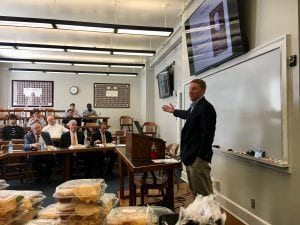
Benjamin Powell, director of the Free Market Institute and professor of economics at Texas Tech University, visited the SMU Tower Center to give a lecture on why free migration makes economic sense.
The economic case for migration is simple: the more freely the factors of production, such as goods and services, natural resources, and labor, can move, the more efficient and productive the economy will be. Obviously, natural resources cannot be moved, which means the movement of labor is important in order to harness as much creative and productive potential as possible.
The world’s GDP doubled
Economists estimate that totally free movement of people would double the world’s GDP. Powell acknowledges that so much migration would create issues, but he argues that the money gained from a doubled GDP could be used to alleviate these problems.
Why would there be such massive gains from free movement? The first reason, according to Powell, is that there are massive restraints in place. This means removing the restraints would create massive change and would lead to huge results. The second reason for the gains is that humans are the ultimate resource. Powell believes that some of the world’s cleverest and most creative minds are locked in “crappy places” where their creativity is stifled and wasted.
For example, if someone were to move from Haiti to the U.S. and nothing else were to change about that person including his/her occupation that person’s income would increase by 1,000 percent. The talent is there, Powell said, but the necessary environment for success is not.
What about the brain drain?
A common argument opposing free movement is the fear of a “brain drain.” This refers to a country’s smartest people fleeing to other countries to make use of their high-level skills, thereby leaving their home country to remain impoverished. Powell argues we shouldn’t worry about this. The only reason people work to acquire these desired skills is to have the opportunity to emigrate and live a better life. People also often forget about remittances–a $404 billion industry. The amount of money sent back to home countries from the people who have left is four times the amount of money countries receive from international aid. Finally, migration of people from autocratic countries to freer countries facilitates the transfer of free ideas around the world.
While Powell sited vast bodies of research from economists to supports his above claims, he said the one thing economists don’t know is what the optimal level of immigration is. To figure that out, he said, we need to let the markets decide.